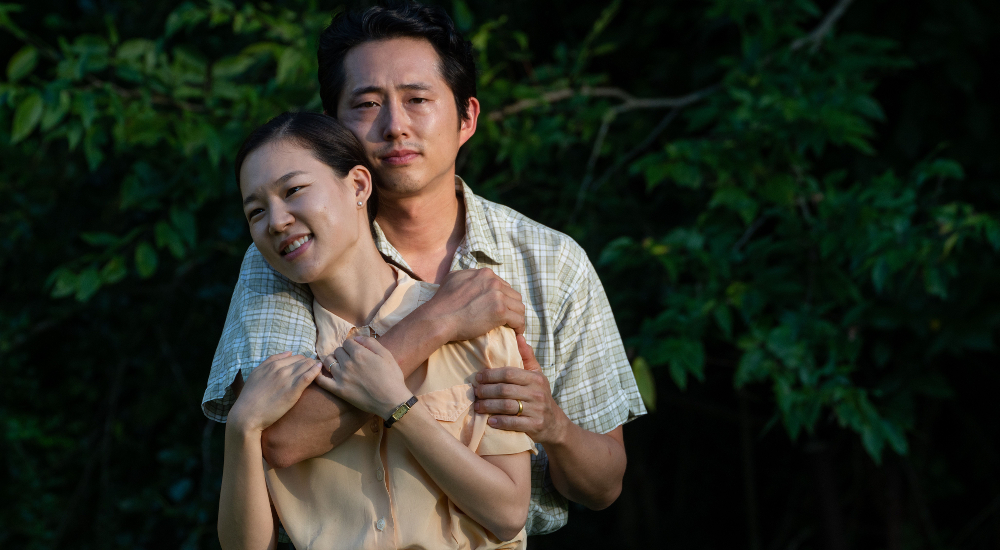"This isn't what you promised."
Capturing the raw beauty that exists in the simplicities of life, Lee Isaac Chung's Minari is a gorgeously kind, enriching, and wholesome film that channels your inner emotions as it analyzes what signifies a family.
Steven Yeun stars as Jacob, an aspiring farmer who has uprooted his family from California to live out his dream. Longing for a slower pace, he hopes their new home, a sluggish double-wide on fifty acres, will please his wife, Monica. But the move is a struggle, especially given his son's heart condition.
Rooted in heritage and tradition, Minari works hard to paint an authentic picture of migrant life in the 1980s. Pushing to create his version of the American Dream, Jacob longs for a sense of success and belonging. His work in chicken-sexing is unfulfilling, even though he is good at it. His wife (Year Han) doesn't share the same skillset. Their move is a byproduct of her inability to keep up, though Jacob sees the opportunities it creates for him as well.
When the family pulls up to their new home, Monica can't hide her dismay. How is this trailer, situated in the middle of an open field, a representation of their lifelong work? From the viewer's perspective, there couldn't be a better showcase. Inside, wallpaper is peeling from the corners, the carpet coarse with heavy use. But the heart and emotion of the structure lie beneath the surface, immediately spotlighting the film's primary theme: family.
As Jacob works the land, we become more familiar with the family dynamics. Their son, David, has a severe heart condition; with both working and money tight, they desperately need a caretaker. Adhering largely to cultural expectations, Monica's mother (a profound Yuh-jung Youn) moves in to assist.
Youn's Soonja is a bright spot within the film as she represents a different generation, unAmericanized and unaware of the customs that her daughter is working to employ. Their countering mannerisms are a delightful aspect of the large-scale narrative, their love for one another undeniable. A testament to the assumed family life, Soonja's presence marks a stiff reminder of cultural expectations, many of which denote a stark difference compared to the life Jacob and Monica lead.
As Jacob begins to burn through money, struggling to turn a profit on the land, tensions within the household reach an apex. Though we receive little information regarding their past life in California, Monica isn't happy with the change. Jacob's struggle reads all over his face as he desperately searches for a sign of approval. Though we rarely see the exhausting work that goes into such a daunting undertaking, there is little doubt of his dedication and drive.
One of the most intriguing sequences comes when the family decides to attend church. The only minorities in the congregation, Chung beautifully interweaves a series of ignorantly racist remarks, earmarking them for context while refusing them permission to define the moment. It's a unique balance that he effortlessly masters, unapologetically refusing to overlook the obvious while showing no hesitation to counter them with attempts at southern hospitality.
These moments, short in duration but lasting in context, occur throughout the film, highlighting a degree of unknowing and uncertainty that immigrants must endure. Will Patton's Paul, a business partner of sorts to Jacob, bears a cross every Sunday, walking it down the dirt road from the church. He, too, finds himself on the receiving end of degrading comments. In part, this bonds the two men, outsiders to the community, beating to their independent drums as they work to create a life for themselves and those they love.
One afternoon, Soonja and David venture down to the slow-moving river that runs through the property. Here, amid the low water level, the pair decide to plant the minari seeds Soonja has brought from overseas - a story element that would never happen today. Though a backdrop for much of the film, the minari represents a piece of their former life, a part they struggle not to lose as they adapt and fight for their new home. The plant grows like a weed but provides for all, regardless of social class. The metaphor here does not go unnoticed.
As Jacob continues to work the land, sacrificing his family's water for the sake of his crops, a fraction within the household begins to widen. Though Monica's frustrations are well warranted, much of her dismay lies in the unfulfilled promises her husband made long before the move. The third act reveal allows a wealth of honest, stifled emotions to rise to the surface.
Beautifully crafted and serenely delivered, the film's final moments are it's most refined. Boasting stellar performance from everyone involved, Minari showcases the struggles that stem from vulnerability while highlighting the always-shifting components of family. Much like the family we follow, no scene outshines the other, giving way to a remarkable, fully embracing experience.

